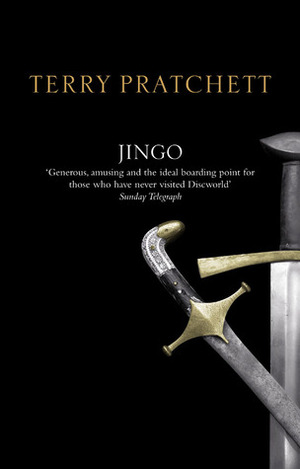
This is part of the Pratchett Project.
The blurb:
Throughout history, there's always been a perfectly good reason to start a war. Never more so if it is over a 'strategic' piece of old rock in the middle of nowhere. It is after all every citizen's right to bear arms to defend what they consider to be their own. Even if it isn't. And in such pressing circumstances, you really shouldn't let small details like the absence of an army or indeed the money to finance one get in the way of a righteous fight with all the attendant benefits of out-and-out nationalism...
It's April, which means, in Australia, Anzac Day is not far away. I'm of a generation that has seen Anzac Day observances at its lowest, post-Vietnam and through the 80s, and then saw Bob Hawke go to Gallipoli and then John Howard jingo it right the hell up, to the point where any critique of the day started to get side-eyed as being 'unAustralian', so it feels kind of appropriate that reading Jingo landed around this time of year.
The waters between the city-state of Ankh-Morpork and the Klatchian Empire are usually pretty peaceful, except for the occasional Curious Squid fishing dispute between a couple of Ankh-Morporkian and Klatchian fishermen.
Then one night, there's suddenly land where there wasn't any land before — the island of Leshp has risen from the sea. There's not much to it, just some silt and ruined buildings with curious designs on them, but it's enough to trigger a war between Klatch and Ankh-Morpork. The rest of the novel is an examination of jingoism and how easily people are manipulated into seeing the enemy as just The Enemy, dehumanised and turned into not people (as I write this, I've just finished reading Night Watch, and there's a few moments in there where Pterry's characters undo this rather neatly; I'll link to the review for that when I've written it). There's a side trip into Laurence of Arabia as well, and an exploration via Vimes and Vetinari of just how far up the food chain the rule of law applies. Their conclusion, not surprisingly, is all the way up — Vimes arrests Vetinari for treason, even though it feels profoundly unsettling, because there's no way Vetinari is treasonous against Ankh-Morpork, really, but it's the right thing to do.
There's a section in the middle where Vimes, as Commander of the Watch, meets the Klatchian ambassador, Prince Khufurah. The prince inquires (probably in affectedly accented speech) about the term 'raghead' that he's heard citizens of Ankh-Morpork shouting at him; Vimes honestly answers that it's an insult, and Khufurah observes that everyone else he'd asked that question suddenly developed a coughing fit and was unable to answer. It's a mark of Vimes's integrity as a character; he doesn't do anything as stupid as 'never tells a lie' but he instinctively knows when to lie and when to tell the truth. He feels out of his depth almost constantly, but his...I want to say 'instincts' but one of the best points about Sam Vimes is how firm a chokehold he keeps on the worst of them...his sense of rightness is actually a pretty good compass for him. Or weathervane, to borrow one of the symbols that pops up now and then.
Lawyers argue about who Leshp belongs to; there is precedent, since the island has risen before. Klatchian precedent says Klatch owns it; Ankh-Morporkian precedent says A-M owns it, of course. So the inevitable happens and the city's nobility starts building up their own armed forces. Even Vimes's butler, Willikins, signs up, and his conduct is a kind of microcosm of the changes wrought in people between peacetime and war — from ultra-urbane to cliche-shouting, almost overnight.
In the end, Vetinari, with help from Leonard of Quirm and, surprisingly, Fred Colon and Nobby Nobbs, manages to manage an end to the war and things are set right. Leshp disappears back into the ocean to the relief of its real owners, the curious squid (I said all it had was silt and curious carvings, didn't I?), Vetinari is unarrested and Vimes gets his worst nightmare as a reward — he's promoted to Duke of Ankh-Morpork.
I appreciate the broadening of scope in Jingo; it's nice to see Ankh-Morpork interacting with its neighbours, even if the interaction is a bit on the spiky side. The next books in the Watch series, The Fifth Element, takes that even further.
Started: 5 April 2025
Finished: 9 April 2025
Back home.
More books.
More from the Pratchett Project.